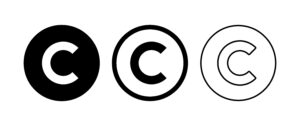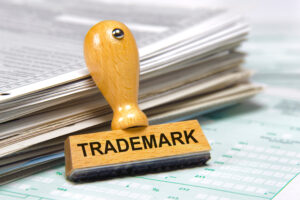DEMYSTIFYING INTELLECTUAL PROPERTY: TRADEMARKS, COPYRIGHT, AND WHAT IT ALL MEANS
What is IP? What is the difference between a trade mark and copyright?
Intellectual property (IP) covers a range of legal rights which protect an intellectual creation and can be used to prevent others from stealing or copying. IP rights are also valuable assets which can be sold or licensed. IP includes:

Trade marks, which are any signs used in trade to indicate origin. They can include words, logos, patterns, colours, sounds and the shape of products or their packaging. In the UK, a trade mark can be registered at the UK Intellectual Property Office (UKIPO). A trade mark registration can be renewed indefinitely. It is also possible to acquire unregistered rights in a trade mark through use. However, it is more difficult to prove that you were the first to use a mark and have acquired the necessary rights, so we always recommend registering a trade mark.
Copyright, which provides protection for literary, dramatic, musical and artistic works and arises automatically. It is not possible to ‘register’ copyright in the UK! Copyright doesn’t protect ideas or concepts but protects the expression of those ideas – the work must be original and “fixed” (e.g. drawn / written down / recorded / typed / photographed / sculpted). Copyright lasts for 70 years after the death of the creator.
Designs (registered and unregistered), which protect the appearance of a product – including shape, packaging and decoration – for a limited period.
Patents which are registered rights that protect new inventions or processes for a limited period.
A single product can enjoy some or all of the above types of protection.
How do I protect my IP? Should I trademark my business, and how? What aspects can I protect? If you own the biz on companies house, is it the same thing as owning the trade mark?
Although it is not necessary to have a trade mark registration in order to use a trade mark, a trade mark registration will provide you with the strongest protection against third parties using identical or similar marks, and is not expensive (provided no objections are raised by the UKIPO or third parties).
It should also be noted that registering your company at Companies House does not give you trade mark protection for the company name.

To be registrable, a trade mark must be distinctive (e.g. you could not register the letter A as a trade mark) and cannot be descriptive of the goods and services covered.
- For example, ‘Apple’ is distinctive for computers but not for fruit. When a trade mark application is filed, you must state the goods and services the mark will be used in relation to. It is not possible to add goods/services later on, so have a think about potential expansion plans for your brand within the next five years.
A trade mark application can be filed in the name of an individual or a company and you should carefully consider who will be the owner of the trade mark, particularly if it is your own name.
- In the case of chef James Cochran, a trade mark registration for his name was owned by his ex-employers which meant they were able to continue using the name once he left the restaurant that they owned. If the application had been filed by James Cochran himself, he would have had control over who could use the mark and could have licensed it to the restaurant under agreed terms.
The UKIPO website provides clear guidance on filing a UK trade mark application yourself. A Trade Mark attorney can also handle the filing process and ensure you obtain the broadest protection.
Someone is using my name, what are my rights?
If another person or company is using your brand, then you have the right to stop them from doing so, providing you acquired registered or unregistered rights before them. This might be in a business name, logo or slogan that is either identical or similar to yours. Your rights are slightly different depending on whether you have a registered trade mark for your brand name / logo.
If you have a registered trade mark and a competitor is using a mark that is either identical or similar to your mark and for the same type of business, this may amount to trade mark infringement and you have legal rights to take action against them.
You or your lawyer should write to the infringing business and ask them to cease and desist their use.
This will involve asking them to change their name or logo, and to undertake that they will not use the infringing mark in future. If they do not engage with this correspondence, then you are entitled to issue legal proceedings for trade mark infringement.

If you do not own a trade mark registration for your brand, you do still have rights in the eyes of the law if another company uses a brand name or logo that is similar or identical to yours.
If you can prove that your use of a brand pre-dates that of an infringer (unless they have a prior trade mark registration), then their use may amount to passing off.
The law of passing off enables you to defend your business against someone whose use of a mark causes damage to you or your brand by misleading the public into thinking that their goods or services originate from you (or that your businesses are economically linked).
- As with trade mark infringement, you should first write to an infringer to seek to agree that the competing business will change their name. If this fails, you can consider issuing legal proceedings for passing off.
- Passing off can be a harder and more costly case to prove than trade mark infringement as the legal tests and evidence requirements are more complex, so we would always recommend filing a trade mark registration to protect your brand.
How do I know if I’m infringing someone else’s IP?
You are infringing someone else’s trade mark if you use, in the course of trade, a sign which is identical or similar to another for similar goods or services. It does not always matter if your use has caused actual consumer confusion, but this can be relevant.
It is important to conduct trade mark searches before launching a new brand in order to check for any earlier trade marks owned by third parties which you might inadvertently infringe, and any other obstacles to registration. Although it is easy to become attached to a brand name, it is better to identify any issues pre-launch before you invest financially (and emotionally). No-one wants to receive a cease and desist letter, or to have to incur the cost and hassle of rebranding.
An earlier trade mark registration may pose a risk if it is identical or similar to your chosen trade mark, covers identical or similar goods and services, and there is a likelihood of confusion between the marks.
Well-known trade marks (e.g. Coca-Cola) have an additional layer of protection and can be infringed even where there is no risk of confusion, as people will often try to free-ride on their reputation. The owner of an earlier trade mark registration may prevent use and registration of your chosen trade mark by claiming your use infringes their rights (in which case they can sue you) and opposing your trade mark application (which simply stops you from acquiring your own registered trade mark).
You can conduct basic searches for registered trade marks via the UKIPO website, or obtain professional advice from a Trade Mark Attorney who can conduct more comprehensive searches and advise on the risks posed. This is relatively inexpensive compared to the cost of rebranding or fighting a legal battle!
Even if a third party doesn’t own a trade mark registration, they may have acquired unregistered rights in a trade mark through use in the UK.
Unregistered rights are not as straightforward to establish, but may be relied upon to prevent use and registration of your chosen trade mark by way of a ‘passing off’ claim. You should therefore also conduct general Google/social media/Companies House searches before launching a new brand to check whether your chosen trade mark is already being used in the same or similar business areas.
If you discover that there is already a company out there with an identical or similar brand to your own, particularly if they are using or have registered it in relation to similar goods or services (if your business is a restaurant, then think restaurants, cafés, bars and clubs as well as takeaway delivery services, food and drink suppliers, butchers, bakers, grocery stores etc), it is likely that the rights to that brand are owned by whoever used or registered the trade mark first.
If you discover that you have a brand that is similar or identical to another company, you should undertake searches to find out who’s use or registration was first, or ask a Trade Mark Attorney to do it for you.
If the other company has earlier rights, then you should seriously consider changing your own brand to avoid infringement/passing off threats or claims in future.
Can someone else trade mark my business once I’ve already started trading?
The simple answer is no.
Providing a significant section of the public (by no means a majority, but beyond your immediate local area) recognises the brand as distinctive of your business. Once you start trading under your brand name, even if you don’t register a trade mark for your brand, you acquire goodwill in the name / logo, and this can give you rights to exclusive use of the mark. You can then stop third parties from using and registering their own identical or similar trade marks for identical or similar goods and services. Likewise, if someone applies for a trade mark in bad faith, this is grounds to oppose that application or, once registered, to invalidate their registration.
However, this is often difficult and costly to prove, and we would always advise obtaining trade mark registrations for your brand as it can be more difficult to prove prior use or bad faith against someone else who uses your brand where you don’t have a dated registration.
Our contributors, from Stobbs Intangible Asset Management
Will Haig
Will is a solicitor who specialises in commercial contracts, particularly those which relate to IP. He also has experience in trade mark, copyright, design and licensing disputes in the High Court and IPEC.
WILL.HAIG@IAMSTOBBS.COM
Tasha O’Shea
Tasha is a Chartered Trade Mark Attorney. She has experience working with a diverse range of clients across various sectors, and particularly enjoys working with small businesses and start-ups to highlight the importance of brand protection.
NATASHA.O’SHEA@IAMSTOBBS.COM
Sarah Stephens
Sarah is a trainee solicitor in the litigation team at Stobbs IAM. She has worked on cases in the High Court and IPEC.
SARAH.STEPHENS@IAMSTOBBS.COM
